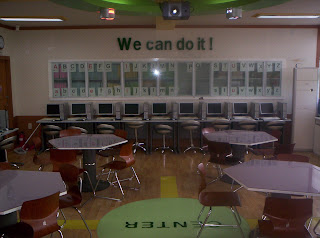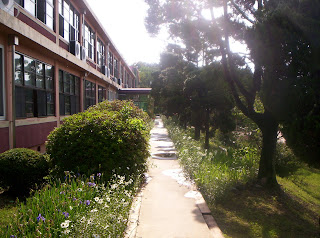 Friday morning I missed my bus so I grabbed a taxi. I pass a narrow bridge over a large river and then I'm at my school. Here's a mountain in the distance. That's my bank to the right.
Friday morning I missed my bus so I grabbed a taxi. I pass a narrow bridge over a large river and then I'm at my school. Here's a mountain in the distance. That's my bank to the right. This is a garden at my school. It's very beautiful! Jo-an Elementary has a lot of property, and they don't let any of it go to waste. Our soccer field is huge, our playgrounds are frequent, and we have a driving range as well as a garden for each grade to practice their farming. We're actually a very small school with only one homeroom teacher for each grade level. We are also an associate school of another school in Guri. Like General Nash Elem, we get the problem kids. A common kinship has been established.
This is a garden at my school. It's very beautiful! Jo-an Elementary has a lot of property, and they don't let any of it go to waste. Our soccer field is huge, our playgrounds are frequent, and we have a driving range as well as a garden for each grade to practice their farming. We're actually a very small school with only one homeroom teacher for each grade level. We are also an associate school of another school in Guri. Like General Nash Elem, we get the problem kids. A common kinship has been established. This must be what I look like to my students. This picture was taken by CH.
This must be what I look like to my students. This picture was taken by CH. CH is an awesome student but he's a few levels above the other third grade boys. Being a sort of ringleader, can often be a deciding factor in how the class goes. However, there is never just ONE deciding factor. Teaching a class of 10 year-olds who don't understand most of my vocabulary demands a wide range of control.
CH is an awesome student but he's a few levels above the other third grade boys. Being a sort of ringleader, can often be a deciding factor in how the class goes. However, there is never just ONE deciding factor. Teaching a class of 10 year-olds who don't understand most of my vocabulary demands a wide range of control.
For instance: how can I find a balance between ten girls--sensitive but eager to learn, and ten boys--full of energy but unwilling to sit down--without losing someone in between? The trouble is if I lose someone then they might bring someone else along with them, and then one by one the whole class is gone.
I find that a very active game will get the boys going but the girls crying (since they usually can't keep up with the physical energy of the boys). Yet a well planned arts & crafts project can entertain the girls but fail to grab the interest of any of the boys. What's the best way to utilize an English classroom?
 I'm still trying to figure this out. I can never have too many lesson plans but I can never follow through with one all the way through. Teaching a class of developing minds is like navigating the sea: you need a compass and a direction, an intention and a destination, but if the current ever shifts direction you can't ever fight it, you've just got to change course for a little while. Fortunately I can always catch a nice breather if I'm ever feeling a little taxed.
I'm still trying to figure this out. I can never have too many lesson plans but I can never follow through with one all the way through. Teaching a class of developing minds is like navigating the sea: you need a compass and a direction, an intention and a destination, but if the current ever shifts direction you can't ever fight it, you've just got to change course for a little while. Fortunately I can always catch a nice breather if I'm ever feeling a little taxed. A front view of Jo-an elementary from the side. Right before lunch my kindergardeners invited me to a birthday party!
A front view of Jo-an elementary from the side. Right before lunch my kindergardeners invited me to a birthday party! I got dragged around the playground. . .
I got dragged around the playground. . .
 . . . until we found a rabbit.
. . . until we found a rabbit. We lost it somewhere in the bushes. After this I eat lunch and teach three afternoon classes. I find myself emulating my middle and high school Latin and math teachers to teach my sixth graders grammar.
We lost it somewhere in the bushes. After this I eat lunch and teach three afternoon classes. I find myself emulating my middle and high school Latin and math teachers to teach my sixth graders grammar.  And no, I don't have a Korean girlfriend and I can't speak fluently.
And no, I don't have a Korean girlfriend and I can't speak fluently.